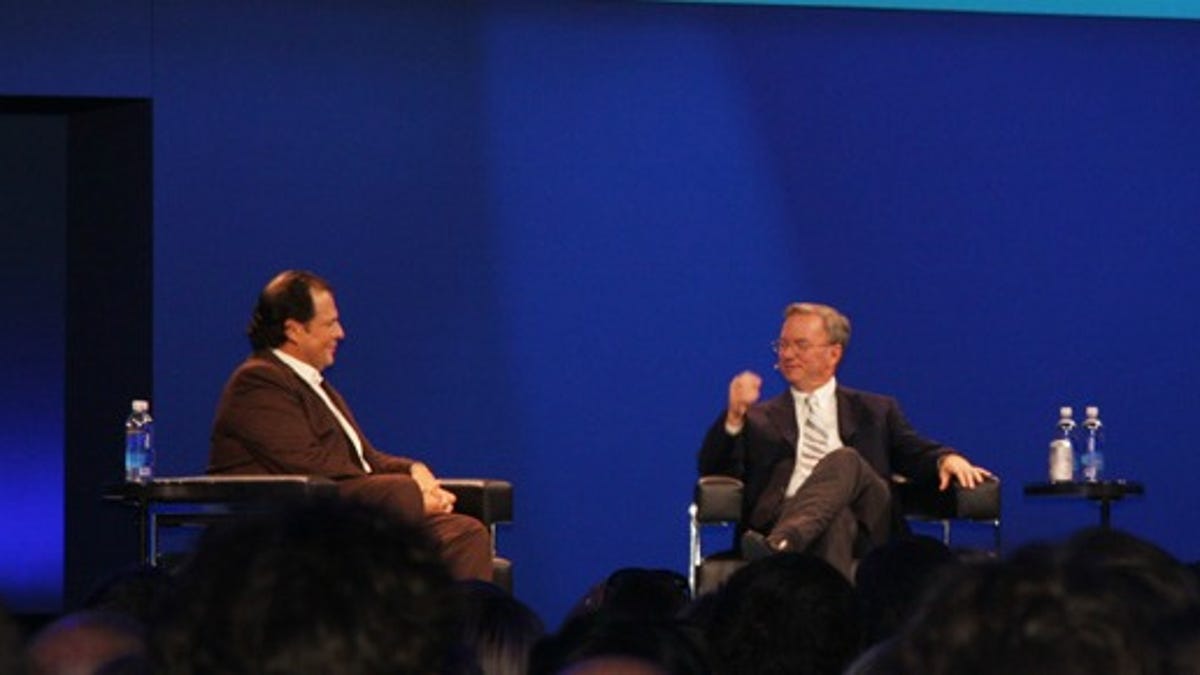Google's Schmidt talks Apple, patents, jobs
At Dreamforce 2011, the Web titan's executive chairman weighs in leaders including Steve Jobs, Steve Ballmer, and Mark Zuckerberg.

SAN FRANCISCO--Google's executive chairman Eric Schmidt sat down for an afternoon interview with Salesforce.com's CEO and chairman, Marc Benioff, at Dreamforce 2011 here yesterday.
Unlike some of Schmidt's recent public talks about Google+, Google TV, and what Google wants to do with online identities, this discussion was less controversial and spoke more broadly about the IT industry as a whole.
This being Salesforce's major annual conference, naturally Schmidt discussed cloud computing. When asked about his early days back at Sun Microsystems in the 1980s, Schmidt noted that company "tried to imagine a world that was networked" and that it "essentially invented the open systems model." The problem? It didn't have the technology to follow through with its ideas and dreams.
Fast-forward to today, and the architecture is finally in place. Schmidt said that he is most excited by the next generation of entrepreneurs and seeing what they can do on top of these platform.
"The next generation of these leaders will be doing something mobile, local and social," Schmidt posited, "These are terms we use today for the way people live and work."
Related stories:
• ZDNet Australia: Legacy firms should follow Apple, Schmidt says
• Schmidt: TV makers to adopt Google TV within 5 years
• Google, Facebook spar over Google+ invite issue
• Google just bought itself patent protection
Benioff asked specifically about several bigwigs in Silicon Valley. In a younger age group, obviously Facebook's CEO Mark Zuckerberg stands out, with Schmidt acknowledging that what he has done is "really impressive."
Schmidt had some criticism when asked about Microsoft and its CEO, Steve Ballmer. But Schmidt kept things diplomatic by saying that Microsoft did a "brilliant job" at building "around model of control and licensing." Microsoft's problem, Schmidt argued, was that "they did not organize around the consumer--they organized around the industry structure."
Who did organize around the consumer and became a huge success because of it? Apple, according to Schmidt, stating that Apple proves that if you organize around the consumer and solve that problem, then the revenue will show up.
Schmidt also had kind words about former Apple CEO Steve Jobs, to much applause from the audience, saying that "what Steve has done at Apple is certainly the best performance of a CEO" in history. It's extraordinary, Schmidt said, because "he's not only done this once, but he's done this twice."
One of the more pressing topics for Google these days comes down to patents. Schmidt touched on this briefly when asked about Motorola, insisting that Google bought Motorola Mobility for "more than just patents" and "that the Motorola team has some amazing products coming."
But as for patents in general, Schmidt isn't happy with the way things are run. Arguing a number of reasons from how patents were handed out too generally in the 1990s to the district courts that approve them, Schmidt said that patents are important, but he'd like to crowd-source them or at least have them approved in a more "systematic" way.
Finally, Schmidt also touched on the U.S. jobs market. We have heard repeatedly in the last month and throughout the last week that Salesforce is looking to expand its employee base considerably.
But it's going to take a lot more than just the tech industry to get unemployment numbers lower again in America. Schmidt pointed toward manufacturing, saying that it's easy to blame unions, high costs, and other things as to why the U.S. is not a leader in this sector anymore. Regardless, Schmidt argued, we need to get more competitive and take advantage of the "cheap dollar" we have right now.
Additionally, Schmidt pointed toward the federal government, saying that "jobs are created by the private sector, and government policies have a huge influence on this."
This story originally appeared at ZDNet's Between the Lines under the headline "Google's Schmidt talks Apple, patents and jobs at Dreamforce."

